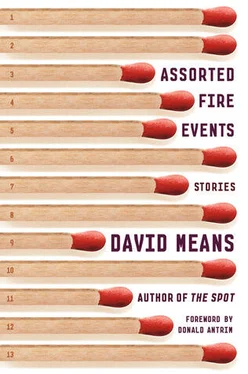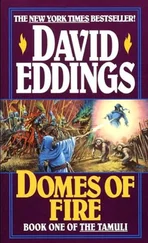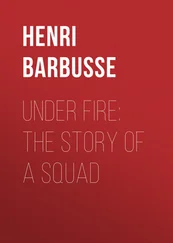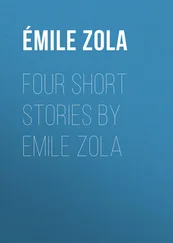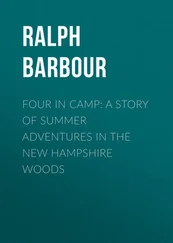David Means - Assorted Fire Events - Stories
Здесь есть возможность читать онлайн «David Means - Assorted Fire Events - Stories» весь текст электронной книги совершенно бесплатно (целиком полную версию без сокращений). В некоторых случаях можно слушать аудио, скачать через торрент в формате fb2 и присутствует краткое содержание. Год выпуска: 2012, Издательство: Faber & Faber, Жанр: Современная проза, на английском языке. Описание произведения, (предисловие) а так же отзывы посетителей доступны на портале библиотеки ЛибКат.
- Название:Assorted Fire Events: Stories
- Автор:
- Издательство:Faber & Faber
- Жанр:
- Год:2012
- ISBN:нет данных
- Рейтинг книги:4 / 5. Голосов: 1
-
Избранное:Добавить в избранное
- Отзывы:
-
Ваша оценка:
- 80
- 1
- 2
- 3
- 4
- 5
Assorted Fire Events: Stories: краткое содержание, описание и аннотация
Предлагаем к чтению аннотацию, описание, краткое содержание или предисловие (зависит от того, что написал сам автор книги «Assorted Fire Events: Stories»). Если вы не нашли необходимую информацию о книге — напишите в комментариях, мы постараемся отыскать её.
won a Los Angeles Times Book Prize, was nominated for a National Book Critics Circle Award, and received tremendous critical praise. Ranging across America, taking in a breathtaking array of voices and experiences, this story collection now stands as one of the finest of our time.
Assorted Fire Events: Stories — читать онлайн бесплатно полную книгу (весь текст) целиком
Ниже представлен текст книги, разбитый по страницам. Система сохранения места последней прочитанной страницы, позволяет с удобством читать онлайн бесплатно книгу «Assorted Fire Events: Stories», без необходимости каждый раз заново искать на чём Вы остановились. Поставьте закладку, и сможете в любой момент перейти на страницу, на которой закончили чтение.
Интервал:
Закладка:
Arno held on to Roy and guided him along the back of the train station, which stood dark before rails of bleeding rust. One train a day came through to pick up passengers and go on to Detroit, crawling so slowly it didn’t polish the rust away. They were heading towards the old B.+O. control tower, a wobbling tinderbox, half burned along one side by someone’s out-of-control campfire; behind it was an old wax paper factory, every window broken out, gaping at the snow-filled sky. (This was around the time Horton, inside Wal-Mart, held up a set of white lights and said, tightly, “I’d rather maintain tradition.”) And behind them, fifty yards, near the graded road crossing, was a red spot in the snow where Roy had vomited, folded over like an empty wallet while Arno held him around the waist, feeling only the hard bones, nothing left in the way of legs.
“Fucking hold on, Roy,” Arno said.
“We’ll make it, old man,” Roy said.
“Shit’s a foot deep if it’s two.”
“Yep.”
Roy didn’t want to die; and Arno was busting ass to keep him moving. Snow was falling lightly. Everything had a five-inch coat. There was nothing — to Roy’s mind — like the silence of a snowy night, especially in the worst parts of town where, out of their own dilapidation, hulks of the past took on a particular beauty. He loved that. Many winters he’d huddled in the B.+O. tower with his fellows, taking sips, smoking, listening to nothing at all except, perhaps, the keen buzzing isolation of his own loneliness. The tower was a good place to be, and he wanted to be there. It was high up. No matter how often the railroad boarded over the windows, a crew of homeless folks took it upon themselves to shove the plywood sheets away. Under a pile of newsprint, in a corner, you could usually find warmth enough to hold you until daylight. But his busted gut was sending shooting pain across his rib cage. The autopsy would reveal a bruised spleen. His own memory of events had been culled by drink, anyway. If one were to compile all that Roy could fully remember on this snowy night, one might have an oblong collection of images: cold wooden floors; windows with holes stuffed with yellowed paper, the paper mill across the street where his old man used to work; the way men sat on the windowsills in the summer, holding their lunch boxes, eating; the long gaunt features of his mother’s face twisting when she was hit, the vacant recesses of her eyes, beady and black. Nights on the streets removed many memories completely. His life now subsisted on a small kernel at the very center of his mind, and that kernal was the side of his father’s wide palm striking him one morning when he was about eight, breaking his jaw so that it hung as limp as laundry from the line … and that was enough to fuel him on this snowy night.
The gardener was extremely thin, his dark blue work pants limp from his legs, and the hose quivered in his hand. Her gin and tonic was finished, and she was sitting, watching the light fade away from the rubble, the sea glistening, listening to voices rising up from the beach below. She wasn’t sure of his name — Miguel was her guess. He was hired by Peter, and Peter did most of the talking to him.
“Hola,” she said.
He grunted, lifted the hose a bit too high, splashed water on his toes. He lay the hose at the base of a bush and took a bandanna from his pocket to wipe his shoes. They were the kind of shoes she saw for sale at the market: truck-tire treads, cheap, thin, suede leather. She’d gone to the market that morning, accompanied by Peter, who said it was part of his job to drive visitors — ones who didn’t have rented cars — to Carbonaras. The intense dryness of the country along with the unexpected relentlessness of the morning heat seemed to kick her olfactory nerves into high gear. Suddenly everything had a precise smell: The dust. Sand. The rocks around the houses. The buckets of cheap, plastic housewares. Rows of detergent bottles. Long tables of leather goods; and of course the fish and bread. On the deck, watching Miguel slosh water around the other bushes (if she had looked carefully she would have seen how he plied the hose with great respect, sloshing but only in a certain jittery way. The scarcity of water was a part of his bones, his dry, brittle skin; from the wells it came saline and rank), she touched the side of her arm near her elbow where Peter, in the crush of the crowd, had held her, guided her like a blind woman.
From the B.+O. tower switch room there was a view of the cantilevered arches holding up the snow-covered roof of the unused train station. Along one wall of the building stood an old luggage cart with metal wheels, the only thing that hadn’t been destroyed, vandalized, painted over with tags, defiled by piss or shit or broken glass because it was too large — and the wheels were frozen in place with rust — to shove off the platform. In the tower a long tongue of snow had drifted in through the missing window and forced them back against the rear wall, where they sat, legs up, huddled against each other. Roy’s breathing was labored and deep. His face was rough with unshaven hair. He seemed to work his mouth around each breath. Arno lit a Camel, took a draw, held it to his friend’s mouth.
“Come on, you old fuck. Hang on.”
(Hang on. To what? For what? Arno had not the slightest idea how or what the old fuck was supposed to hang on to. For his death was so much writing on the wall, a certitude against which no bets would be placed. His statement here was perhaps just a lulling platitude spoken out of a sense of duty to those conditions of death. In that case it might be said that Arno had risen to the highest condition of humanity in that he was playing out his role upon the stage, the penultimate stage, of the end of his friend’s life. On the other hand, maybe Arno meant it; maybe he simply wanted Roy to hang on to life, nothing more, or less. Perhaps his idea of dragging Roy to the B.+O. tower was to find at least a small bit of domesticity; four walls, perhaps a blanket of old Elma Gazettes, maybe a jackpot bottle of port; better yet, maybe they’d get arrested and find contentment in jail.)
At least they’d made a night of it, dragging themselves all the way down Main in the snow before stumbling upon Zeek, who was up against the inside corner of a white-scratched Plexiglas bus shelter smoking a tiny, reed-thin, crack-laced joint, jittery with cold and stretched nerves. Inside the shelter, headlights bled like long sizzling lines of melting ice across the milky Plexiglas. The men had a powwow, snorting the cold air, gulping from the neck of a bottle of Boone’s Farm cherry wine Zeek had stolen from another wino at knifepoint. When that was gone, Zeek materialized — actually saying the word abracadabra — from behind Roy’s head a bottle of Thunderbird, and, opening it, put it to Roy’s lips and let him tilt his head back for as long as he wanted. He fed Roy the wine the way you’d feed a baby. Burping the old fuck; making sure he wasn’t getting too much air. And even though he was stoned numb, he still got the faint pleasure of seeing the old guy’s blood nourished.
Perhaps it is the nature of some weddings to have as their undercurrent the possibility of great violence and tragedy; perhaps that alone is what we hear buzzing beneath the music, the silent movement of balloons and tossed confetti over the hiss of starched gowns, the embrace of tight collars and cummerbunds. The DJ knew this. He understood it well.
Coming back from the bar with another Scotch, Standard considered the stale business atmosphere of Elma, the depleted economic resources of that part of the state, and a recent study indicating a severe shortage of piping material and rising prices because of Islamic wars in regions of the globe he was hard-pressed to locate on a map. He felt ready for some shift in the world. The music was easing. There was a sudden lull. A chunk of the general chatter was gone, and many people — standing and sitting — seemed to shift course, like a flock of geese changing direction in midflight. Just before he turned to see Roy staggering in the doorway, he recalled Melville going down the rickety stairs of his office, shoulders straight, braced by the pin-striped suit. The Standard Piping sign, wind-blistered, in need of repair, hung limp in the background. He’d given a halfhearted lift of his fist to the kid, wanting to yell something out but knowing that things have changed and that the Melvilles of the world have prevailed. It isn’t any use. He went back into the office and sat down on his duct-taped chair and thought about it — not exactly seething, but nursing the tight anger that he kept inside him all the way through the summer and into the winter, feeling it as he stepped from his Lincoln Towncar into the cold, across the lobby of the hotel and into his fourth (or was it fifth?) Scotch. So when he turned and saw Roy, the deep wrinkles dwelling on the homeless man’s face, the old navy watch cap politely in his hand, he felt a sharp pleasure at knowing there was going to be a general ruckus. The stench, the shit smell, was already drifting around.
Читать дальшеИнтервал:
Закладка:
Похожие книги на «Assorted Fire Events: Stories»
Представляем Вашему вниманию похожие книги на «Assorted Fire Events: Stories» списком для выбора. Мы отобрали схожую по названию и смыслу литературу в надежде предоставить читателям больше вариантов отыскать новые, интересные, ещё непрочитанные произведения.
Обсуждение, отзывы о книге «Assorted Fire Events: Stories» и просто собственные мнения читателей. Оставьте ваши комментарии, напишите, что Вы думаете о произведении, его смысле или главных героях. Укажите что конкретно понравилось, а что нет, и почему Вы так считаете.
